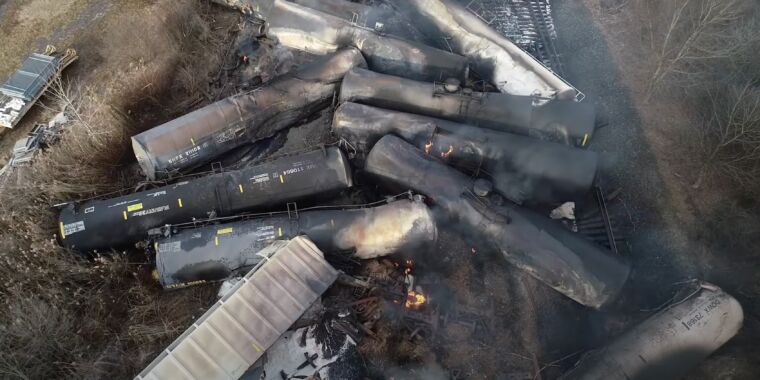Ohio Derailment: Toxic Chemical Lingering – A Community's Fight for Health and Environmental Justice
The February 3rd derailment of a Norfolk Southern train carrying hazardous materials in East Palestine, Ohio, continues to reverberate through the community and beyond. While the immediate crisis response focused on controlled burns of vinyl chloride to prevent a potential explosion, the lingering presence of toxic chemicals remains a major concern, sparking outrage and raising serious questions about environmental safety and long-term health effects. This article delves into the ongoing situation, examining the challenges faced by residents and the broader implications for environmental regulations and emergency response protocols.
Toxic Chemicals and their Lingering Effects
The derailment released a plume of toxic chemicals, including vinyl chloride, butyl acrylate, and ethylene glycol monobutyl ether. While officials claim the air and water are now safe, many residents report persistent health problems, including headaches, nausea, and respiratory issues. The long-term effects of exposure to these chemicals remain largely unknown, adding to the community's anxiety.
Vinyl Chloride: A Persistent Threat?
- Carcinogenicity: Vinyl chloride is a known carcinogen, meaning it can cause cancer. Long-term exposure increases the risk of various cancers, including liver cancer.
- Acute Effects: Short-term exposure can lead to dizziness, drowsiness, and headaches. Higher levels can cause respiratory problems and even death.
- Environmental Persistence: While the controlled burn aimed to neutralize vinyl chloride, concerns remain about potential soil and water contamination. Independent testing is crucial to assess the extent of the contamination.
Other Hazardous Chemicals: A Complex Mix
The presence of other hazardous chemicals complicates the situation. Butyl acrylate is an irritant that can affect the eyes, skin, and respiratory system. Ethylene glycol monobutyl ether is also toxic, posing risks to human health and the environment. The synergistic effects of these chemicals when combined are not fully understood, further complicating risk assessment.
Community Response and Activism
Residents of East Palestine are understandably frustrated and angry. They express distrust in government agencies and Norfolk Southern, citing a lack of transparency and communication. Community activism has grown significantly, with residents demanding independent testing, long-term health monitoring, and stronger environmental regulations.
Demands for Accountability
- Independent Health Studies: Residents are pushing for independent, long-term health studies to monitor the impact of chemical exposure.
- Environmental Remediation: Complete and thorough remediation of contaminated soil and water is essential.
- Transparency and Communication: Open and honest communication from government agencies and Norfolk Southern is crucial to rebuild trust.
The Broader Implications for Environmental Safety
The East Palestine derailment highlights critical flaws in current transportation safety regulations and emergency response protocols. The incident underscores the need for stricter regulations on the transportation of hazardous materials and improved preparedness for such emergencies.
Calls for Regulatory Reform
- Increased Safety Standards: The incident highlights the need for stricter safety standards for the transportation of hazardous materials by rail.
- Improved Emergency Response: Improved training and resources for first responders are essential for effective emergency response.
- Enhanced Environmental Protection: Stronger environmental regulations are needed to protect communities from the impacts of industrial accidents.
Conclusion: A Long Road to Recovery
The situation in East Palestine is far from resolved. The lingering presence of toxic chemicals, coupled with concerns about long-term health effects and environmental damage, presents significant challenges for the community. A commitment to transparency, accountability, and comprehensive remediation is crucial to address the immediate concerns and prevent similar disasters in the future. The long-term impact of this derailment will undoubtedly shape future discussions about environmental regulations and the transportation of hazardous materials across the United States. Further updates and ongoing investigations are critical to ensuring the health and safety of the residents of East Palestine and to preventing future occurrences.
(Note: This article is for informational purposes only and does not constitute medical or legal advice. Always consult with qualified professionals for specific guidance.)
